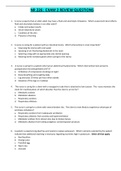Nr 226 fluid electrolyte - Study guides, Class notes & Summaries
Looking for the best study guides, study notes and summaries about Nr 226 fluid electrolyte? On this page you'll find 47 study documents about Nr 226 fluid electrolyte.
Page 3 out of 47 results
Sort by
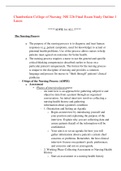
-
Chamberlain College of Nursing :NR 226 Final Exam Study Outline 1 Latest,100% CORRECT
- Exam (elaborations) • 116 pages • 2022
-
- $16.99
- + learn more
Chamberlain College of Nursing :NR 226 Final Exam Study Outline 1 Latest *****ADPIE for ALL!!**** The Nursing Process o The purpose of the nursing process is to diagnose and treat human responses (e.g., patient symptoms, need for knowledge) to actual or potential health problems. Use of the process allows nurses to help patients meet agreed-on outcomes for better health. o The nursing process requires a nurse to use the general and specific critical thinking competencies described ea...
NR 226: EXAM 2 REVIEW QUESTIONS
![NR226 / NR-226 Final Exam (45 OUT OF 45)/(Latest 2021): Fundamentals [Patient Care] - Chamberlain. Already GRADED A](/docpics/6077d7174b7a7_1061688.jpg)
-
NR226 / NR-226 Final Exam (45 OUT OF 45)/(Latest 2021): Fundamentals [Patient Care] - Chamberlain. Already GRADED A
- Exam (elaborations) • 10 pages • 2021
- Available in package deal
-
- $10.99
- 7x sold
- + learn more
NR-226 Final Exam 1. The nurse is precepting a student nurse and explains that perioperative nursing care occurs: a) Before, during, and after surgery. Correct b) In preadmission testing. c) Dur ing the surgical procedure. d) In the post anesthesia care unit. 2. The nurse is caring for a patient who is scheduled to undergo a surgical procedure. The nurse is completing an assessment and reviews the patient’s laboratory tests and allergies. In which perioperative nursing phase would this work be...
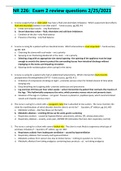
-
NR 226: Exam 2 review questions 2/25/2021
- Exam (elaborations) • 4 pages • 2023
-
- $17.99
- + learn more
NR 226: Exam 2 review questions 2/25/2021 1. A nurse suspects that an older adult may have a fluid and electrolyte imbalance. Which assessment best reflects fluid and electrolyte balance in an older adult? - funds success, pg 369, # 6 a. Intake and output results - only fluid balance b. Serum laboratory values – fluid, electrolyte and acid-base imbalances c. Condition of the skin –only fluid balance d. Presence of tenting – only fluid balance 2. A nurse is caring for a patient with...
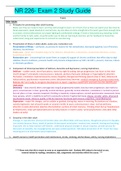
-
NR 226- Exam 2 Study Guide
- Exam (elaborations) • 9 pages • 2023
-
- $17.99
- + learn more
NR 226- Exam 2 Study Guide *** Please note that this is meant to serve as an augmentation tool. Students ARE subject to be tested on any material related to readings, simulations, labs, assignments and activities within the course. *** Topics Older Adults 1. Principles for promoting older adult learning Make sure they are ready to learn; are they well enough to learn; sit in front of pt so they can watch your lips move & facial expression; speak slowly & in normal tone; say one idea at ...
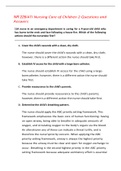
-
NR 226/ATI Nursing Care of Children 2 Questions and Answers,100% CORRECT
- Exam (elaborations) • 52 pages • 2021
-
- $16.49
- + learn more
NR 226/ATI Nursing Care of Children 2 Questions and Answers 1) A nurse in an emergency department is caring for a 4-year-old child who has burns to the neck and face following a house fire. Which of the following actions should the nurse take first? A. Cover the child's wounds with a clean, dry cloth. The nurse should cover the child’s wounds with a clean, dry cloth; however, there is a different action the nurse should take first. B. Establish IV access for the child with a large-b...
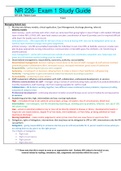
-
NR 226- Exam 3 Study Guide NR 226: Patient Care *** Please note that this is meant to serve as an augmentation tool. Students ARE subject to be tested on any material related to readings, simulations, labs, assignments and activities within the course. *
- Exam (elaborations) • 4 pages • 2023
-
- $17.69
- + learn more
NR 226- Exam 3 Study Guide NR 226: Patient Care *** Please note that this is meant to serve as an augmentation tool. Students ARE subject to be tested on any material related to readings, simulations, labs, assignments and activities within the course. *** Topics Pain Management 1. Pain in older adults, adults, children and infants; nursing process Pain in older adults – muscle mass decrease, body fat increases, & percentage body water decreases (means increase concentration of water...
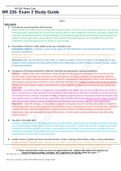
-
NR 226- Exam 2 Study Guide (Patient Care)
- Other • 8 pages • 2021
-
- $10.99
- + learn more
NR 226- Exam 2 Study Guide Topics Older Adults 1. Principles for promoting older adult learning Make sure they are ready to learn; are they well enough to learn; sit in front of pt so they can watch your lips move & facial expression; speak slowly & in normal tone; say one idea at a time straight & to the point; give them enough time to answer; minimal distractions w/ proper lighting & comfortable settings; if tired or distracted stop teaching; invite another family to talk; audio, visual & tact...
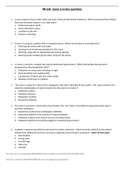
-
NR 226 - exam 2 test taking review questions
- Exam (elaborations) • 4 pages • 2022
- Available in package deal
-
- $11.99
- + learn more
NR 226: Exam 2 review questions 1. A nurse suspects that an older adult may have a fluid and electrolyte imbalance. Which assessment best reflects fluid and electrolyte balance in an older adult? a. Intake and output results b. Serum laboratory values c. Condition of the skin d. Presence of tenting 2. A nurse is caring for a patient with an intestinal stoma. Which intervention is most important? a. Cleansing the stoma with cool water b. Spraying an air-freshening deodorant in the room ...
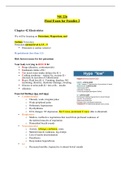
-
NR 226 Final Exam for Fundies 2
- Exam (elaborations) • 17 pages • 2022
-
- $11.99
- + learn more
NR 226 Final Exam for Fundies 2 Chapter 42 Electrolytes We will be focusing on Potassium, Magnesium, and Sodium Potassium Potassium normal level is 3.5 – 5 • Potassium is cardiac sensitive Hypokalemia (less than 3.5) Risk factors/causes for low potassium Your body is trying to DITCH K+ • Drugs (diuretics, corticosteroids) • Inadequate intake of K+ • Too much water intake (dilutes the K+) • Cushing syndrome – retains Na, excretes K+ (increase in secretion of Aldostero...

How did he do that? By selling his study resources on Stuvia. Try it yourself! Discover all about earning on Stuvia

